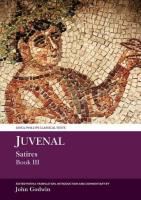
Liverpool (2022) h/b 316pp £97.55 (ISBN 9781800854864)
This is the third volume of Juvenal’s Satires edited by G. in the Aris and Phillips Classical Texts series. Book IV (Satires 10, 11 and 12) appeared in 2016 and Book V (Satires 13, 14, 15 and the unfinished 16) in 2020. It follows the standard pattern of the series, providing a brief but useful and accessible introduction, a commentary, text and translation.
G.’s stated purpose ‘is to help readers to enjoy this poetry, to understand the ideas being discussed and to appreciate the literary qualities of the Latin’. To achieve the last of these aims G. has not only used English lemmata in bold to focus his notes on the English translation (as the series demands) but he has constantly made the actual comment on Juvenal’s Latin. For example, on 7.12 (‘Everything is now the opposite of that …’) G.’s comment on ‘opposite’ is directed at the Latin (‘contra here is adverbial …’). Throughout the commentary there are references to the Oxford Latin Dictionary (OLD), parallel passages/usages, and the rest of what one would expect from a Latin edition.
There is a select apparatus criticus accompanying the text and discussion of variants in the commentary. For example on 7.42 (in qua sollicitas imitator ianua porcas), G. follows Braund (Loeb 2004) in adopting Jessen’s porcas for the rather tame MSS reading portas, and discusses his choice before rendering with bold alliteration palpitating pigs (cf. Juvenal’s use of similar alliteration at 7.93 pulpita pascunt).
G.’s aim to help readers to enjoy Juvenal’s Latin demands attention to features of style. In his introduction G. lists eleven features of the ‘grand style’. Among those features is Juvenal’s general avoidance of ‘primary obscenities’ but G. praises his ‘wonderful ability to be rude without being crude’. G. has no embarrassment in dealing with Juvenal’s obscenity. Satire 9 used to be omitted by some commentators (e.g. Mayor, 4th ed.1886) and the collection presented as ‘Thirteen Satires’. An example of how G. can reflect Juvenal’s choice of vocabulary appears early in Satire 9. Juvenal’s use of inguen (line 4) is a ‘bland’ euphemism (Adams, The Latin Sexual Vocabulary) and G. successfully translates it as ‘groin’. Juvenal still manages to be explicit and G. also does not shy away from the content with his observation that ‘the juxtaposition of inguina barba enacts the activity’.
Juvenal’s subject matter often requires comment and G. offers full explanations without going to the lengths of Mayor’s doorstop commentary. At 7.154 (occidit miseros crambe repetita magistros) the metaphor (rehashed cabbage crambe repetita for rehashed rhetorical exercises) is perhaps easily understood, but G.’s comments include reference to the Greek proverb (‘cabbage done twice is death’) and the dangers of reheating at a time of no refrigeration.
One slight irritation arises from the page headings in the section on commentaries. It would cost little to include the number of the satire alongside ‘commentaries’ as an aid to navigation. But that does not detract from this most welcome edition that should be useful for the experienced Latinist while offering a translation that is fluent and with enough exegesis to convey Juvenal’s meaning, tone and style for the non-Latinist. These satires have attracted a good deal of scholarly attention in recent years especially since Braund’s Beyond Anger was published in 1988. As a guide to scholarship on Juvenal (and beyond), G. has assembled a full bibliography (pp.21-34).
Alan Beale
